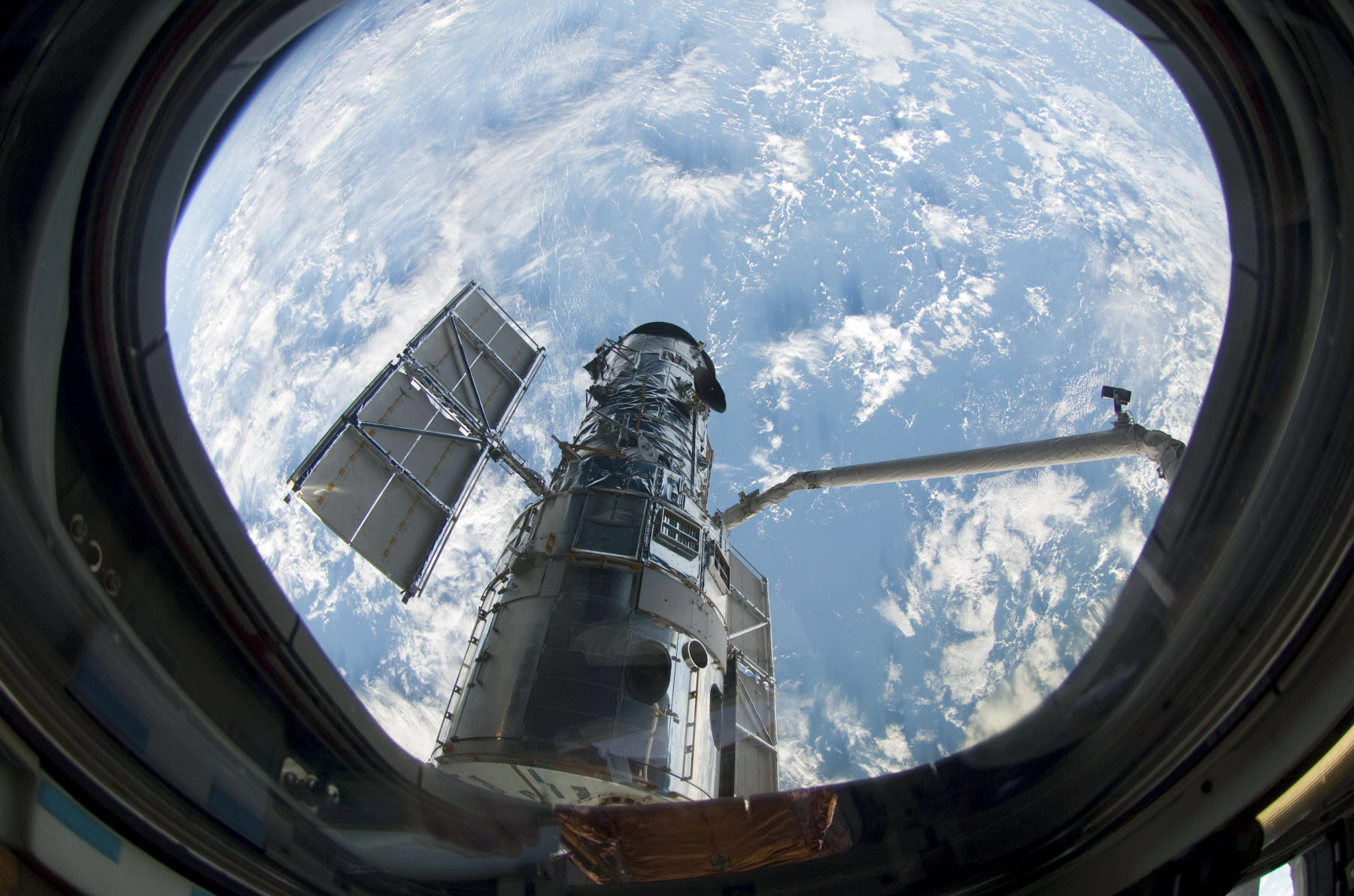|
Vocapedia
>
Space > Astronomy >
Space Telescopes
Hubble
Hubble Team Breaks Cosmic Distance Record
Video NASA 3 March 2016
This animation shows the location of galaxy GN-z11,
which is the farthest galaxy ever seen.
The video begins by locating the Big Dipper,
then showing the constellation Ursa Major.
It then zooms into the GOODS North field of galaxies,
and ends with a Hubble image of the young galaxy.
GN-z11 is shown as it existed 13.4 billion years in the past,
just 400 million years after the big bang,
when the universe was only three percent of its present age.
YouTube
https://www.youtube.com/watch?v=vgQdQx3V1HY
Hubble Space Telescope Reflects the Cosmos
NYT 24
April 2015
Hubble Space Telescope Reflects the Cosmos
Video Out There The New York Times 24
April 2015
After 25 years,
the Hubble Space Telescope
is still surprising us.
Hubble has been called
the most important
advance in astronomy since Galileo,
and its greatest discoveries might still be
ahead.
Produced by:
Dennis Overbye, Jonathan Corum
and Jason Drakeford
Read the story here:
http://nyti.ms/1bAWV3L
Watch more videos at:
http://nytimes.com/video
YouTube
https://www.youtube.com/watch?v=yWxeSpZwF8s

Hubble Photo Images
SM4 Mission
Still photo of the Hubble Space Telescope (HST) following grapple
2009
http://sm4.gsfc.nasa.gov/art/day3/s125e006669.jpg
http://sm4.gsfc.nasa.gov/multimedia/gallery7.php
http://sm4.gsfc.nasa.gov/multimedia/gallery.php
Nasa's Hubble space telescope / orbiting observatory
- launched on April 24, 1990
https://www.nasa.gov/mission_pages/hubble/main/index.html
https://www.npr.org/tags/133249228/hubble-space-telescope
https://www.theguardian.com/science/hubble-space-telescope
2023
https://www.npr.org/2023/08/04/
1192120347/ring-nebula-james-webb-telescope
https://www.npr.org/2023/02/07/
1154840710/whats-the-fairest-way-to-share-cosmic-views-
from-hubble-and-james-webb-telescope
2022
https://www.npr.org/2022/04/13/
1092535922/hubble-telescope-comet-biggest-nasa
https://www.theguardian.com/science/2022/mar/30/
hubble-space-telescope-captures-distant-star-earendel
https://www.npr.org/2022/03/30/
1089626170/the-light-from-this-star-that-astronomers-just-spotted-
is-12-9-billion-years-old
2021
https://www.npr.org/2021/07/16/
1016953132/hobbled-hubble-telescope-springs-back-to-life-
on-its-backup-system
https://www.npr.org/2021/06/23/
1009567351/hubble-trouble-nasa-cant-figure-out-
whats-causing-computer-issues-on-the-telesco
2020
https://www.npr.org/2020/09/07/
909199421/the-hubble-space-telescope-still-works-great-
except-when-it-doesnt
https://www.nytimes.com/2020/04/24/
science/hubble-telescope-30th-birthday.html
2018
https://www.npr.org/2018/12/30/
680994535/nancy-grace-roman-mother-of-hubble-space-telescope-has-died
https://www.theguardian.com/science/2018/oct/26/
hubble-telescope-fixed-by-jiggling-it-around
https://www.theguardian.com/science/2018/oct/09/
hubble-space-telescope-fails-gyroscope
https://www.npr.org/sections/thetwo-way/2018/04/20/
604368999/its-the-hubble-space-telescope-s-birthday-
enjoy-amazing-images-of-the-lagoon-neb
2016
497965415/the-universe-has-almost-10-times-more-galaxies-than-we-thought
https://www.theguardian.com/science/2016/jul/02/
luminous-beauty-of-jupiters-auroras-revealed-by-hubble-telescope
http://www.npr.org/sections/thetwo-way/2016/03/19/
471005496/hubble-space-telescope-pinpoints-monster-stars
http://www.npr.org/sections/thetwo-way/2016/03/04/
469200725/hubble-sees-a-galaxy-13-4-billion-years-in-the-past-breaking-distance-record
2015
http://www.npr.org/2015/04/24/
401753081/after-25-years-the-hubble-space-telescope-still-wows-humanity
http://www.theguardian.com/science/gallery/2015/apr/24/
hubble-at-25-the-space-telescopes-timeline-in-pictures
http://www.nytimes.com/interactive/2015/04/23/science/space/
unforgettable-hubble-space-telescope-photos.html
http://www.theguardian.com/science/2015/apr/23/
the-hubble-space-telescope-its-a-terrific-comeback-story
http://www.theguardian.com/science/gallery/2015/apr/21/
hubble-at-25-the-best-images-from-the-space-telescope
http://www.theguardian.com/science/2015/apr/20/
twenty-five-years-on-hubbles-unsung-heroes
https://www.youtube.com/watch?v=f0LHZNtuuiY
http://www.theguardian.com/science/2015/feb/28/
hubble-at-25-the-cosmos-at-its-most-breathtaking-in-pictures
2014
http://www.nytimes.com/2014/05/28/science/space/
andromeda-and-the-milky-way-a-merger-of-galactic-proportions.html
http://www.nytimes.com/video/science/100000002906469/colliding-galaxies.html
http://www.guardian.co.uk/science/2013/jul/15/neptune-moon-discovered
http://www.guardian.co.uk/science/2013/jul/11/alien-deep-blue-planet-astronomers
http://www.guardian.co.uk/science/2011/jun/16/hubble-photograph-centaurus-a
http://www.guardian.co.uk/science/interactive/2010/oct/15/hubble-space-telescope
http://www.guardian.co.uk/science/2010/may/26/star-planet-yellow-dwarf
http://www.theguardian.com/science/2010/may/01/hubble-space-telescope-nasa
http://www.guardian.co.uk/science/2010/apr/11/hubble-space-telescope
http://www.guardian.co.uk/science/2010/feb/11/hubble-space-telescope-saturn-auroras
http://www.guardian.co.uk/science/gallery/2009/sep/09/hubble-space-telescope-astronomy
http://www.nytimes.com/slideshow/2009/09/09/science/0909HUBBLE_6.html
http://www.nytimes.com/2009/09/10/science/space/10hubble.html
http://www.nytimes.com/2009/05/15/science/space/15hubble.html
http://www.guardian.co.uk/science/blog/2008/oct/30/hubble-space-telescope
http://www.guardian.co.uk/technology/2008/oct/15/spacetechnology-nasa
http://www.guardian.co.uk/science/2007/oct/30/spaceexploration
http://www.usatoday.com/tech/science/space/2006-10-26-hubble-fate_x.htm
http://blogs.usatoday.com/techspace/2006/04/send_up_the_cak.html
1990
https://www.nytimes.com/1990/08/14/
science/despite-flaw-hubble-finds-new-stars.html
gyroscope UK
https://www.theguardian.com/science/2018/oct/26/
hubble-telescope-fixed-by-jiggling-it-around
https://www.theguardian.com/science/2018/oct/09/
hubble-space-telescope-fails-gyroscope
massive star > Earendel
UK
Scientists estimate that Earendel,
whose name means “morning star” in Old English,
is at least 50 times the mass of the Sun
and millions of times as bright,
placing it among the most massive stars known.
But even such a brilliant star
would not normally be detectable.
At such vast distances,
even an entire galaxy is just a smudge of light.
It was only thanks to natural magnification
by a huge galaxy cluster, WHL0137-08,
which sits between us and Earendel,
that astronomers were able to make the detection.
The cluster’s gravitational pull is so intense
that light bends around it,
creating a powerful cosmic magnifying glass
that amplifies light from distant objects lying behind it.
Scientists calculate
that Earendel’s brightness
is magnified by a factor of thousands
– a situation that may not be repeated
with other ancient stars within our lifetimes.
“This might be the earliest star
we will ever see since the big bang,”
said Dr Guillaume Mahler,
an astronomer at Durham University and co-author.
The star’s distance was estimated by its colour.
Light is “red-shifted” away from its original wavelength
as it travels through the expanding universe and so,
although Earendel would have been blue if seen from nearby,
12.9bn years ago,
it appears a deep red in the Hubble images.
The observations have been hailed as hugely significant
and been prioritised for the first cycle of observations
using Nasa’s James Webb Space Telescope,
due to begin in June.
This will allow scientists to definitively confirm
that they are looking at a single, very distant star.
An alternative possibility, deemed very unlikely,
is that it is a dim, nearby brown dwarf.
https://www.theguardian.com/science/2022/mar/30/
hubble-space-telescope-captures-distant-star-earendel
galaxy known as GN-z11
is the farthest galaxy ever seen from Earth,
at 13.4 billion
years in the past USA
http://www.npr.org/sections/thetwo-way/2016/03/04/
469200725/hubble-sees-a-galaxy-13-4-billion-years-in-the-past-
breaking-distance-record
Webb telescope > Hubble's planned successor
USA
https://www.nasa.gov/vision/universe/starsgalaxies/
webb_slinger.html
infrared light
USA
http://www.nytimes.com/slideshow/2009/09/09/science/0909HUBBLE_5.html
visible light USA
https://www.nytimes.com/slideshow/2009/09/09/
science/0909HUBBLE_5.html
orbiting observatory
Explore more on these topics
Anglonautes > Vocapedia
astronomy
spacecraft,
spaceship, probes, telescopes
astronomy >
infrared telescopes > James Webb space telescope
space, astronomy
|